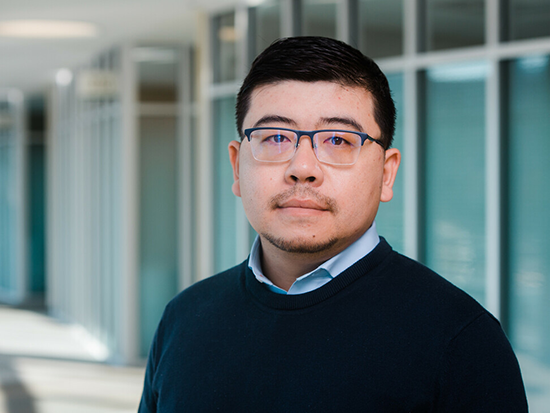 HaoSheng Sun, Ph.D.,
HaoSheng Sun, Ph.D.,
Photography: Lexi CoonHaoSheng Sun, Ph.D., assistant professor in the University of Alabama at Birmingham Department of Cell, Developmental and Integrative Biology, has been named to the inaugural class of Freeman Hrabowski scholars by the Howard Hughes Medical Institute.
The 31 new scholars from 22 U.S. institutions are all outstanding early career faculty in science who have the potential to become leaders in their research fields, as well as advance diversity, equity and inclusion through their mentorship and understanding of the experiences of trainees from races and ethnicities that are underrepresented in U.S. science, the HHMI announced.
Freeman Hrabowski scholars will be appointed to a five-year term, renewable for a second five-year term after a successful progress evaluation. Each scholar will receive up to $8.6 million over 10 years, including full salary, benefits, a research budget and scientific equipment. In addition, they will participate in professional development to advance their leadership and mentorship skills.
Diversity and inclusion are central to Sun’s own background as an LGBTQ+ Chinese-Canadian immigrant.
“Throughout my scientific training, opportunity and excellent mentorships have allowed me to pursue my dream career of academic research,” HaoSheng said. “I hope to pay this forward to the next generation of science trainees by establishing a fun and all-inclusive lab environment where rigorous science is conducted at UAB. Promotion of strong mentorship, scientific outreach and diversity/inclusivity are important components of our lab culture.”
The Sun Lab studies transcriptional and chromatin-based mechanisms of neural development/plasticity, and how they are dysregulated in neural disorders. “Our brains are made up of largely the same composition of neurons from birth to adulthood, yet we exhibit extensive behavioral changes across our lifespan,” Sun said. “Our laboratory aims to identify genetic timing mechanisms that govern the maturation of our nervous system and how environmental factors influence these mechanisms.”
Research by Sun and his UAB colleagues utilizes C. elegans and rodent animal models, in combination with genomic, genetic, behavioral and microscopy techniques. C. elegans is a transparent roundworm that is about 1 millimeter long, and has been a model that has led to fundamental biological insights and discoveries for 50-plus years.
Freeman Hrabowski scholars will be employed by HHMI and will maintain an academic appointment and lab at their research institutions, like HHMI investigators. The appointment is for a five-year term as an HHMI lab head, renewable for an additional five-year term following a successful progress evaluation. Scholars will receive generous and flexible support from HHMI, including full salary and benefits, a research budget of approximately $2 million over the first five years, and eligibility to participate in HHMI capital equipment purchasing programs
Over the next 20 years, HHMI expects to hire and support up to 150 Freeman Hrabowski scholars — appointing roughly 30 scholars every other year for the next 10 years. The institute has committed up to $1.5 billion for the Freeman Hrabowski scholars to be selected over the next decade. HHMI is the largest private biomedical research institution in the nation.
“Each of our Freeman Hrabowski scholars has demonstrated their unique potential to advance cutting-edge science and carve out pathways for the inclusive development of postdocs, students and other researchers,” said HHMI Vice President and Chief Scientific Officer Leslie Vosshall. “We are thrilled to welcome this inaugural cohort to HHMI, and we are proud to support each scholar’s contributions to the broader scientific community in the years to come.”
HHMI named the program in honor of Freeman A. Hrabowski III, president emeritus of the University of Maryland, Baltimore County, and a major force in increasing the number of scientists, engineers and physicians from backgrounds underrepresented in science in the United States. HHMI announced the launch of the Freeman Hrabowski Scholars program in May 2022.
Hrabowski grew up in segregated Birmingham, Alabama, and was part of the Children’s Crusade for civil rights as a 12-year-old in 1963. Both his parents were teachers, and Hrabowski graduated from Hampton Institute with high honors in mathematics when he was 19.
At UAB, Cell, Developmental and Integrative Biology is a department in the Marnix E. Heersink School of Medicine.